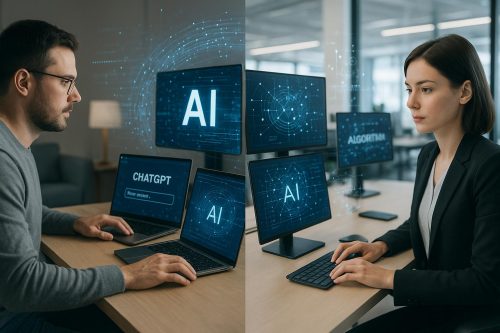Future cybersecurity jobs and the cybersecurity job market are set to transform by 2030, driven by advancements in AI, automation, and evolving cyber threats. Key points:
- Demand Surge: By 2030, an estimated 85 million cybersecurity jobs may remain unfilled globally, causing potential economic losses of $8.5 trillion annually.
- AI’s Role: AI is automating 75% of security tasks, creating roles like AI Threat Analyst and Cyber Risk Automation Specialist.
- New Roles: Jobs like Digital Trust Officer and Ethical AI Auditor are emerging to address AI ethics and build trust in digital systems.
- Skills Needed: Expertise in machine learning, cloud security, compliance, and ethical AI is critical. Certifications like CISSP and CEH are valuable.
- Training Focus: Continuous learning through certifications, hands-on labs, and AI-specific courses is essential for staying competitive.
Cybersecurity professionals must prepare for a future where technical expertise, ethical oversight, and adaptability to AI-driven tools are key to success.
Yes, AI Will Replace Cybersecurity Jobs (If You Let It)
Major Trends Changing Cybersecurity Employment by 2030
The way cybersecurity jobs are shaping up for the future is being influenced by three major forces: a growing talent gap, the impact of AI on job roles, and the rising importance of ethical considerations. Together, these trends are redefining the cybersecurity landscape.
Cybersecurity Talent Shortage
The numbers paint a stark picture of the cybersecurity workforce crisis. By 2030, the global shortage of cybersecurity professionals is projected to hit 85 million workers, potentially leading to $8.5 trillion in unrealized annual revenue. Right now, the demand is already overwhelming, with 4 million unfilled cybersecurity positions worldwide. In North America alone, 522,000 cybersecurity roles remain vacant, while India struggles to fill 30% of its 40,000 vacancies due to a lack of skilled workers.
This talent gap has a cascading effect, increasing risks across industries. In fact, two-thirds of organizations report facing additional threats because of unfilled cybersecurity roles.
“It is imperative for decision-makers to prioritize cybersecurity talent management as a strategic necessity.”
Despite the urgent need, only 15% of companies expect significant growth in cyber skills by 2026. This mismatch between demand and supply is reshaping the job market, creating new opportunities for those willing to step into the field. For instance, the U.S. Bureau of Labor Statistics predicts a 33% growth in information security analyst roles from 2023 to 2033 – a pace nearly ten times faster than the average for all occupations.
The shortage is also driving up salaries and encouraging companies to hire candidates with transferable skills. Many organizations are now offering training programs to help professionals from IT, engineering, and even non-technical fields transition into cybersecurity roles.
While the lack of skilled workers strains current teams, the rise of automation and AI is beginning to change how cybersecurity roles are defined.
How AI and Automation Are Changing Cybersecurity Roles
Artificial intelligence is reshaping the cybersecurity landscape, not by eliminating jobs but by redefining them. The market for AI in cybersecurity is expected to grow from $22.4 billion in 2022 to $60.6 billion by 2027, driving transformative changes in how security teams operate.
By 2025, AI is expected to automate 75% of security operations tasks. Routine monitoring and response activities are increasingly handled by AI, allowing cybersecurity professionals to focus on more strategic responsibilities, like fine-tuning AI models or analyzing sophisticated threats.
The sheer scale of cyber threats makes automation a necessity. For example, in 2024, cybercriminals launched 36,000 malicious scans every second – a volume no human team could manage manually. On top of that, the rise of generative AI has fueled a 1,200% increase in phishing attacks since late 2022. Automated systems are essential for detecting and responding to these threats.
New roles are emerging as a result of this shift. Job titles like Security Automation Engineer, AI Threat Analyst, and Machine Learning Security Specialist are becoming more common, blending traditional cybersecurity expertise with AI and data science skills.
“AI won’t replace cybersecurity professionals, but it will transform the profession.”
- Chris Dimitriadis, Chief Global Strategy Officer, ISACA
Even entry-level roles are evolving. Instead of spending hours sorting through minor alerts, newcomers are now working alongside automation tools, focusing on cases that require human insight. This shift not only improves efficiency but also accelerates career growth by exposing professionals to complex challenges early on.
Specialists in cyber risk automation are also in demand. These roles involve designing and maintaining AI-driven security systems capable of adapting to new threats. Professionals in this space combine traditional cybersecurity knowledge with machine learning to optimize automated responses.
“Humans will focus more on strategy, analytics, and program improvements. This will necessitate continuous skills development of existing staff to pivot their roles around the evolving capabilities of AI.”
- Sam Hector, Senior Strategy Leader, IBM Security
Growth of Ethical AI and Digital Trust Roles
As AI continues to transform cybersecurity, the focus on ethics and trust is growing. Companies are increasingly creating roles dedicated to overseeing ethical AI practices and ensuring digital trust, recognizing that cybersecurity is about more than just stopping breaches – it’s also about maintaining confidence in digital systems.
One emerging role is the Digital Trust Officer. These professionals combine cybersecurity expertise with risk management, compliance, and communication skills to create frameworks that reinforce trust in technology. Their work spans public communication, regulatory compliance, and cross-departmental collaboration.
The rise of generative AI has also highlighted the need for Ethical AI Auditors. These experts evaluate AI systems for issues like bias, fairness, and potential misuse, ensuring that automated security decisions align with ethical standards.
“The best way to rein in AI risks is with more employee training. People have to know what to look out for, especially as AI technology evolves.”
- Mike Arrowsmith, Chief Trust Officer, NinjaOne
AI-based security systems, while powerful, have limitations. They excel at identifying known threats but struggle with unfamiliar scenarios and lack the ability to make ethical decisions independently. This underscores the need for human oversight to ensure these systems function as intended.
The integration of ethics and trust into cybersecurity is creating opportunities for professionals with diverse backgrounds. Legal experts, ethicists, and social scientists are finding their way into cybersecurity through these specialized roles, bringing fresh perspectives and addressing challenges that go beyond traditional technical solutions.
New Cybersecurity Job Roles Expected by 2030
As cybersecurity rapidly evolves toward predictive, automated, and ethically governed practices, emerging roles are reshaping how security tasks are approached. These positions aim to address the growing threat landscape and close the persistent talent gap in the field.
AI Threat Analyst
AI threat analysts are at the forefront of integrating artificial intelligence into cybersecurity. These professionals use machine learning to sift through massive data sets, uncovering patterns that traditional methods might overlook. Their primary focus is analyzing network traffic anomalies and predicting potential attack trends before they unfold. Unlike conventional analysts who respond to threats as they arise, AI threat analysts take a proactive approach. They employ predictive models to pinpoint vulnerabilities, helping organizations stay ahead of attackers.
These analysts work closely with security teams to craft defense strategies against AI-driven threats while safeguarding their own systems from exploitation. The role demands a mix of technical expertise and AI knowledge, including skills in machine learning, effective prompting, and identifying errors in AI-generated outputs. Foundational cybersecurity skills – like networking, incident response, and endpoint security – remain critical. Additionally, strong communication abilities are key, as these analysts must clearly convey complex findings to decision-makers while weighing the ethical considerations of AI-powered security measures.
In tandem with AI-focused roles, automation-centered positions are also gaining traction.
Cyber Risk Automation Specialist
Cyber risk automation specialists are responsible for developing and maintaining systems that automate the assessment of organizational risks. With modern threats becoming faster and more complex, these specialists focus on creating workflows that continuously monitor compliance, evaluate vendor risks, and generate real-time risk assessments by scanning thousands of endpoints simultaneously – without requiring constant manual oversight.
Their day-to-day tasks include refining machine learning models, automating compliance monitoring, and scripting responses to potential threats. This role not only streamlines risk management but also opens pathways to senior positions in risk management or executive roles like Chief Information Security Officer (CISO), as organizations scale their cybersecurity operations.
Beyond technical automation, roles that emphasize trust and communication are expanding.
Digital Trust Officer
The digital trust officer role bridges cybersecurity expertise with business strategy, focusing on building confidence in an organization’s digital systems. These professionals ensure that data protection, privacy, and ethical technology practices are prioritized and effectively communicated to stakeholders. They work across departments – such as legal, compliance, marketing, and customer service – to maintain consistent messaging about the organization’s security measures.
Digital trust officers play a crucial role during incidents like breaches or regulatory updates. They must have a firm grasp of regulations like GDPR and CCPA, as well as emerging AI governance standards, to translate complex technical concepts into clear, trustworthy language. Professionals in this role often have diverse backgrounds, including cybersecurity, risk management, compliance, or even marketing, but they share the ability to align technical decisions with stakeholder trust.
As trust-building positions grow, oversight roles are becoming equally essential.
Ethical AI Auditor
With the rapid rise of artificial intelligence, ethical AI auditors are becoming indispensable in ensuring responsible AI deployment. By early 2024, 72% of companies are expected to adopt AI, and 56% plan to implement generative AI within the next year. This surge in adoption underscores the need for thorough oversight. Ethical AI auditors review AI systems for bias, fairness, and regulatory compliance. For instance, the EU AI Act, set to take effect by 2026, could impose fines of up to €35 million or 7% of global revenue for non-compliance.
The challenges in this role are significant. The OECD AI Incidents Monitor has documented 8,000 AI-related incidents worldwide, marking a 1,200% increase year-over-year. Despite this, only 18% of organizations have established enterprise-wide councils to oversee AI governance. Ethical AI auditors must navigate immature governance frameworks, ambiguous definitions of AI, and the rapid evolution of technology. To succeed, they need a deep understanding of AI algorithms, the development lifecycle, and global regulations.
These auditors focus on principles such as Fidelity, Accountability, Non-discrimination, and Governance. By collaborating with development teams, they help build governance frameworks that align with both global and industry-specific standards.
sbb-itb-eb32bf3
Skills and Training for Future Cybersecurity Professionals
The demand for cybersecurity professionals is skyrocketing, with job growth expected to hit 32% between 2022 and 2032. By the end of 2025, the global cybersecurity market is anticipated to exceed $200 billion, creating an urgent need for individuals with the right mix of technical expertise and a willingness to keep pace with rapidly changing technologies. As new roles emerge, so do the specific skills and training required to succeed in this dynamic field.
Required Skills for Future Cybersecurity Jobs
Emerging positions like AI threat analyst, cyber risk automation specialist, digital trust officer, and ethical AI auditor require a unique combination of traditional security knowledge and cutting-edge tech expertise. Here’s a closer look at the skills these roles demand:
- AI Threat Analysts: These professionals must be well-versed in machine learning, data analysis, and large-scale pattern recognition. They need to interpret AI-driven insights while remaining vigilant about biases in automated systems.
- Cyber Risk Automation Specialists: Proficiency in scripting languages like Python and PowerShell is crucial. They also need a deep understanding of hybrid cloud security architectures, as many risk automation systems operate in cloud environments.
- Digital Trust Officers: This role requires a blend of technical know-how and strong communication skills. Familiarity with regulations like GDPR, CCPA, and emerging AI governance standards is essential. The ability to explain complex technical issues in simple terms is key to fostering trust within organizations.
- Ethical AI Auditors: These specialists must have an in-depth understanding of AI algorithms, development processes, and global regulatory frameworks. Keeping up with new governance standards is critical as they tackle the ethical challenges of AI oversight.
Across all these roles, advanced technical abilities such as cloud security expertise, incident response skills, risk management strategies, and ethical hacking techniques are essential. Foundational programming knowledge is also crucial, particularly for understanding how attackers might exploit AI systems.
Training and Certification Options
Certifications remain a cornerstone for demonstrating cybersecurity expertise. Employers often prioritize candidates with recognized credentials, as these validate both technical skills and a commitment to the profession. Below is a breakdown of key certifications for various career stages:
| Certification | Target Role | Focus Area | Cost |
|---|---|---|---|
| CompTIA Security+ | Entry-level roles | Core security fundamentals | $404 |
| CISSP | Senior positions | Advanced security program design | $749 |
| CEH | Penetration testing | Ethical hacking techniques | $950-$1,199 |
| CISA | Audit and compliance | Information systems auditing | $575-$760 |
| GCIH | Incident response | Security incident handling | $979 |
For those aiming to specialize in AI-related roles, traditional certifications should be paired with training in machine learning and AI security. Programs like the Google Cybersecurity Professional Certificate and Google Cloud Cybersecurity Professional Certificate, available on Coursera Plus for $59 per month, offer hands-on experience with cloud and AI-powered security tools.
When choosing certifications, it’s wise to analyze job listings for commonly required credentials. Beginners might start with CompTIA Security+, while seasoned professionals can pursue advanced certifications like CISSP or niche credentials in areas like AI security.
University and professional organization certificate programs provide another route for skill-building, often focusing on forward-looking topics like quantum-resistant encryption and smart city protection. These programs typically combine theoretical instruction with practical labs, giving participants real-world experience with modern security tools.
Finally, staying competitive in this fast-changing field requires continuous learning. Attending conferences, taking online courses, and participating in hands-on labs are all effective ways to keep skills sharp and stay ahead of the curve.
AI-Powered HR Automation and Cybersecurity
The intersection of artificial intelligence and human resources is transforming how companies safeguard sensitive employee information. As businesses increasingly turn to AI-driven platforms for managing confidential data, the demand for strong security measures has grown immensely. This surge in cybersecurity investments is largely tied to the need to protect automated HR systems, highlighting the pressing importance of securing HR data through AI integration.
Modern HR departments process a staggering volume of sensitive information – ranging from Social Security numbers and salary details to medical records and performance reviews. When this data is handled by AI-powered systems, it can expose vulnerabilities that traditional security methods may struggle to address. This evolving landscape underscores the critical role of cybersecurity in safeguarding HR-specific data and ensuring organizational resilience.
Improving Security in HR Processes
AI-driven automation is reshaping HR security by minimizing manual errors and enabling real-time threat detection. For instance, platforms like Davavo‘s digital assistants streamline tasks such as leave management, payroll, and benefits administration. These systems use encryption and strict access controls to protect sensitive data, while also maintaining detailed audit trails for compliance. They can even identify anomalies and flag potential threats instantly, making HR workflows more secure and efficient.
The impact of AI on HR security is already evident. A major healthcare provider that adopted an AI-powered HR assistant reported a 40% drop in data entry errors within six months and successfully thwarted two unauthorized access attempts before any data was compromised. Additionally, businesses using AI-based security solutions have seen a 30–50% reduction in HR-related security incidents over a two-year span.
Some key advancements in HR security include:
- Automated compliance monitoring: AI systems help organizations stay aligned with regulations like GDPR and CCPA by updating data handling protocols automatically and generating compliance reports. Research shows this can reduce audit preparation time by up to 60%.
- Predictive threat detection: Machine learning algorithms analyze data access patterns to identify unusual activity, often catching potential breaches before they happen – a crucial feature for cyber risk specialists.
- Zero trust security models: These models enforce constant verification of users and devices accessing HR systems, ensuring robust protection even when traditional defenses fail.
Combining Automation with Human Control
While AI automation offers powerful tools for improving security, the best systems integrate human oversight to ensure ethical and effective decision-making. Human-in-the-loop processes allow qualified professionals to review critical decisions related to data access or threat responses. This oversight is especially important in addressing algorithmic bias and navigating complex or high-stakes scenarios.
In this framework, digital trust officers play a pivotal role by creating guidelines for responsible AI use and collaborating with ethical AI auditors to conduct regular bias assessments. These professionals also update AI models based on real-world feedback and emerging risks. Many organizations adopt a layered security approach, where AI handles routine monitoring and alerts, while humans evaluate exceptions or high-risk activities. This balanced strategy reduces the risks of over-reliance on AI, such as false positives, overlooked biases, or missed nuances in complex cases.
Regular system audits, transparent decision logs, and employee training on AI ethics further bolster trust in automated HR systems. The role of an AI threat analyst exemplifies this collaboration, as they interpret AI-generated insights while remaining vigilant for potential biases. By blending technological advancements with human expertise, these professionals ensure that security decisions are both data-driven and ethically responsible.
Conclusion: Getting Ready for Future Cybersecurity Jobs
As cybersecurity continues to evolve, professionals must be prepared to adapt by mastering both established practices and emerging technologies. Future cybersecurity jobs will demand a mix of technical expertise, ethical insight, and a solid understanding of business strategies.
Lifelong learning is the foundation for success in this field. With the global cybersecurity workforce gap exceeding 4 million professionals in 2024, the demand for skilled individuals has never been greater. Developing technical skills, particularly in areas like automation and AI-driven threat detection, will set candidates apart in this competitive landscape.
The rise of specialized roles such as AI threat analyst and ethical AI auditor demonstrates the industry’s shift toward intelligent automation. These positions require not only technical expertise but also a deep understanding of ethical considerations and regulatory compliance. Organizations are increasingly seeking professionals who can ensure the fairness of AI systems, uphold compliance standards, and build trust in digital ecosystems. These roles are already making an impact, as seen in real-world applications.
For instance, platforms like Davavo’s digital assistants are streamlining complex security processes while maintaining human oversight, showcasing how automation can enhance operational efficiency. Recent incidents highlight the importance of combining AI-driven tools with ongoing education to address evolving threats effectively.
New roles, such as digital trust officer and cyber risk automation specialist, emphasize the growing need to bridge technical security with business strategy. These positions demand the ability to translate complex technical concepts into actionable insights for diverse stakeholders, ensuring that organizations remain secure and resilient.
To succeed in this rapidly changing landscape, professionals need to focus on three key areas: building technical expertise, grounding themselves in ethical principles, and gaining practical, hands-on experience. Those who start developing these capabilities now will position themselves at the forefront of technology, ethics, and security.
With cybersecurity jobs expected to grow by 32% through 2030 – far outpacing the average for most occupations – the opportunities are immense for those ready to rise to the challenge. The question isn’t whether these roles will emerge, but whether you’ll be prepared to claim them.
FAQs
What new cybersecurity roles will emerge by 2030, and what skills will professionals need to succeed?
By 2030, the cybersecurity landscape will introduce roles like AI Threat Analyst, Digital Trust Officer, and Ethical AI Auditor to tackle new challenges arising from advancements in AI, IoT, and quantum computing. These positions will demand expertise in areas such as cyber risk automation, AI threat analysis, and ethical AI practices, paired with strong communication and problem-solving skills.
Take the role of an AI Threat Analyst, for example. This professional will specialize in detecting and countering AI-driven cyberattacks. Meanwhile, a Digital Trust Officer will focus on safeguarding digital identities and ensuring data integrity in an increasingly interconnected digital ecosystem. To excel in these roles, professionals will need to embrace continuous learning, adapt to emerging technologies, and navigate complex, automated cybersecurity systems with precision.
How is AI shaping the future of cybersecurity jobs, and what does this mean for today’s workforce?
AI is transforming the cybersecurity job market by taking over routine tasks like log analysis and basic threat detection. This shift frees up cybersecurity professionals to concentrate on more critical responsibilities, such as tackling complex risks and crafting forward-thinking defense strategies. Rather than eliminating jobs, AI is reshaping them, paving the way for emerging roles like digital trust officer and ethical AI auditor.
The growing use of cyber risk automation is also fueling the need for specialized expertise. Upskilling in AI and automation technologies has become increasingly important for professionals in the field. As these changes unfold, there’s a rising demand for individuals who can manage AI-driven tools, ensuring they function both ethically and efficiently. For cybersecurity specialists, this evolving landscape calls for a mix of strategic insight and advanced technical skills to stay ahead of the curve.
How can professionals prepare for the rising demand in future cybersecurity jobs and help close the talent gap?
Professionals aiming to meet the rising demand for cybersecurity jobs of the future should prioritize continuous learning and staying ahead of new developments. Gaining expertise in areas like AI threat analysis, cyber risk automation, and ethical AI auditing will be particularly important, as these fields are expected to see significant growth in the years ahead.
To remain competitive in this evolving landscape, you might want to:
- Pursue certifications such as CISSP or CEH to showcase your technical abilities.
- Engage in workshops or online courses that cover advanced topics like digital trust management.
- Connect with industry experts through conferences or cybersecurity groups to keep up with emerging best practices.
Practical experience and partnerships with training programs tailored to industry needs can also help close the skills gap, ensuring you’re well-prepared for the cybersecurity challenges that lie ahead.





